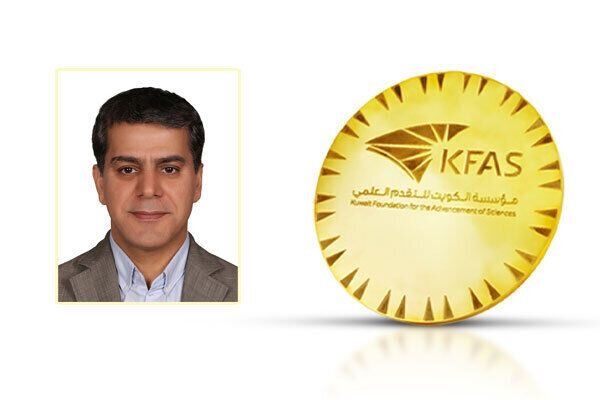Iranian academic wins KFAS prize 2023

TEHRAN – The 2023 Kuwait Foundation for the Advancement of Sciences (KFAS) prize was awarded to Davood Khalili, a faculty member of Shahid Beheshti University of Medical Sciences, for his research and activities in the field of cancer control, cardiovascular diseases, and diabetes in the Eastern Mediterranean region.
He was recognized as the most effective person in the field of prevention and management of non-communicable diseases (NCDs), especially cardiovascular diseases in the countries of the Eastern Mediterranean region, IRNA reported.
The recognition comes in acknowledgment of his dedication and continuous efforts in combating chronic diseases and promoting preventive measures.
The award is one of several institutional awards managed by the World Health Organization, recognizing the contributions of renowned scientists, researchers, or dedicated individuals who have made significant contributions to the prevention, control, or research of cancer, cardiovascular diseases, and diabetes.
The Kuwait Foundation for the Advancement of Sciences (KFAS) is a private non-profit organization based in Kuwait with the mission to further science, technology, and innovation in Kuwait, as well as to promote modernization and a better quality of life. The Foundation supports research in Kuwait and recognizes scientific and educational efforts in the Arab region and beyond.
Over 900 Iranian among top 1% most cited researchers
A total of 938 Iranian researchers were recognized among the world's top one percent most-cited researchers in 2023, the head of the Islamic World Science Citation (ISC) Institute said.
“The Ministry of Science, Research and Technology represents 40 percent, and the Ministry of Health, Treatment, and Medical Education accounts for 48 percent of the most-cited Iranian researchers,” ISNA quoted Ahmad Fazelzadeh as saying.
In 2023, 938 top researchers affiliated with Iranian organizations were identified, which shows a 12 percent increase compared to the previous year. Over the past decade, the number of highly-cited researchers in the country has been growing.
Medicine and Health with 33 percent, Multidisciplinary with 23 percent, Engineering with 20.5 percent, Basic Sciences with 12 percent, Agriculture and Environment with 10 percent, and Social and Human Sciences with 1.7 percent held the highest shares of the most-cited researchers, respectively.
One of ISC’s main responsibilities is to introduce highly-cited researchers and to provide the possibility to identify and introduce elite researchers and scholars. That is why scientific elites are the most important factor in the growth and development of scientific systems, and the number of institutions and highly-cited researchers is one of the criteria of scientific authority in the world.
The ISC Institute extracted and monitored the latest list of the world's top 1 percent most-cited Iranian researchers in 22 science subject areas based on the Essential Science Indicators (ESI) database.
In 2023, the University of Tehran, Tarbiat Modares University and Amirkabir University of Technology from the Ministry of Science, Research and Technology, and Tehran University of Medical Sciences, Kermanshah University of Medical Sciences and Tabriz University of Medical Sciences from the Ministry of Health, Treatment, and Medical Education had the highest number of one percent researchers.
Role of knowledge, innovation in progress of a nation
In November 2023, the Vice President for Science, Technology, and Knowledge-based Economy, Rouhollah Dehqani-Firouzabadi referring to the significant role of knowledge and innovation and their tremendous impact on the progress of nations, said Iran's civilization has honored knowledge throughout history.
“Our ancient teachings and the contributions we have made to the advancement of science and technology is a proof of that saying.”
He made the remarks at the 15th session of the United Nations Human Rights Council (UNHRC) Social Forum held from November 2 – 3, in Geneva, IRIB reported.
Iran's developments in the field of science and technology, improving people's welfare by using science and technology capacities, Iran's strategies in dealing with the coronavirus, Iran's technological solutions to improve the health of society, technological employment and solving social problems with soft technologies were among the most important topics of Firouzabadi's speech.
MT/MG
